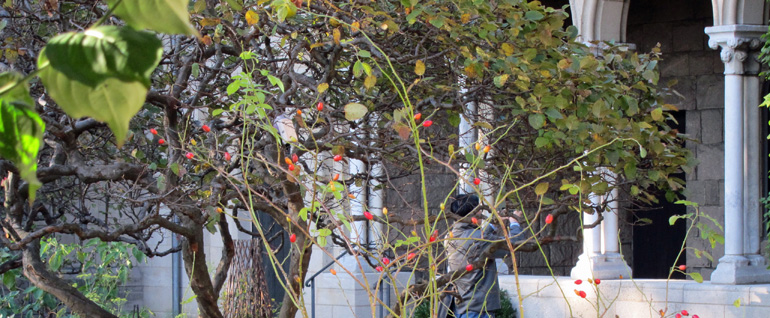
Matins ¶ “How America Will Collapse (By 2025)” — a theme with four nightmarish variations by Alfred McCoy, at Salon. Best read as a wake-up call, the piece takes one thing for granted: that Americans will remain apathetic and inattentive toward global matters and continue to cling to the security blanket of “American exceptionalism.” We have more hope in today’s young people than that, so we renew our call: don’t wait for the older guys to figure things out, because that’s not going to happen. (via MetaFilter)
Lauds ¶ At the Globe and Mail, Russell Smith weighs in on the Object of Beauty interview, but not idly. Mr Smith does not concern himself with what went wrong at the 92nd Street Y. Rather, he suggests that the fiasco lays bare the unworkable premise of such events, which we long ago found unbearably dissatisfying. The artist shows up to present his work, but the audience shows up to get acquainted with the artist. Neither objective makes any sense. All the artist can do is point at something that, if it has been well done, exhausts the artist’s thoughts and feelings &c upon the subject. Read the book. As for the audience, it is clearly hoping for a magical encounter with a shaman, and the created work of art is nothing more than excitingly explosive piffle. How’d he do that? Mr Smith: “Is there any point, really, in trying to promote a book by talking about the book? Or should we just talk about our childhoods?” (via Arts Journal)
Prime ¶ Confronted by a gobbledygook message from Citibank, Felix Salmon decides to take up the offer to call Customer Service with questions. After a round of predictable Kafkosity, he finally connects with an intelligent human being who (a) explains the announcement in simple terms and (b) acknowledges that it took Customer Service itself “quite a long time” to find out what the announcement meant. Why are businesses so anti-communicative? Too many lawyers? CYA? Plenty of both, no doubt. Felix chalks it up to “information asymmetry.” We blame the smiley-face pseudo-polite large-corporation style. It’s the opposite of the zombie look, but it’s just as null.
Tierce ¶ Social psychologist Simone Schnall talks about her work on the close association between cleanliness and morality, between uplift and generosity. Underlying these associations is the stark fact that what we call “thinking” has very little to do with any of it. Indeed, this “thinking” thing looks more like one of those activities that exists only notionally, as an abstract plan that we’re happy to urge other people to follow but that we’re unconscious of never using ourselves. You might say that thinking is for other people. According to Ms Schnall, we’re all much too busy sniffing out disgust. (Edge; via 3 Quarks Daily)
Sext ¶ One of our warmest childhood memories is of sitting through hours and hours of Kabuki (without translations) at City Center. (No wonder we’re so sophisticated!) That’s why this is what we’d like to see: we’d like to see a Kabuki adaptation of the bar fight between a motorcyclist gang member and Ebizo Ichikawa XI, currently the tradition’s “most famous exponent” but also something of a party animal. We bet we’d be able to follow the action this time! The only tricky part would be the doctors’ scene: “Perhaps of more concern to the actor is the suggestion by some medical experts that an injury to his left eye could impair his ability to execute the nirami, a protective, cross-eyed glare that has become his family’s trademark.” (Guardian; via Arts Journal)
Nones ¶ We can’t resist dipping into Today’s Zaman for more post-WikiDump analysis, not least because the diplomatic cables present a world of sanity that the pundits want no part of. Aaron Stein, a freelancer living in Istanbul, writes that the image of Prime Minister ErdoÄŸan reflected in the leaks is that of a pragmatist, not an ideologue. Turkey’s advances toward Iran, for example, may be motivated by nothing more complicated than securing a second source of natural gas (after Russia). Mr Stein concludes that Turkish foreign policy is “rooted in Western political theories.” Perhaps the Kemalist work is done, and it is no longer necessary for Turks to be ashamed of being Turks. Â
Vespers ¶ Chuck Klosterman’s GQ interview with Jonathan Franzen reminds us of the time that Dick Cavett tried to coax Louis Auchincloss into telling tales about Jackie O, but got nowhere. At every turn, no matter how genially he replies, Mr Franzen seems to be underscoring the pointlessness of trying to connect a writer’s personality to his work. When he observes that he has been working at being America’s serious novelist for thirty years, his candor surrounds him with a moat of difference — for after all, who among the (sane) readers of the interview can claim such an ambition, much less thirty years’ pursuit of it? And he proves to be as savvy about his public image as the brightest movie star. At one point, the novelist agrees to answer an “astute” question, but only off the record. “ During the three minutes my recorder is off, he provides one of the most straightforward, irrefutable, and downright depressing answers I’ve ever experienced in an interview. His posture relaxes. His language simplifies. Nothing is unclear.” Jonathan Franzen knows the difference between talking to Chuck Klosterman and talking through him, and he will not do the latter in an unguarded manner. (via The Millions)
Compline ¶ Mr Cringely whispers darkly about the Edifice Complex: “It’s not clear exactly what kind of corporate hubris makes this happen, but almost every dramatic corporate HQ in the Bay Area that was originally owned, not rented, tends to have been built by a company that no longer exists.” We don’t get his choice of illo, though.
Have a Look
¶ Fourteen Actors Acting. (NYT)
¶ MIT’s Proverbial Wallets. (Short Sharp Science)
¶ Jonathan “Saran” Foer. (HTMLGiant)
Noted
¶ Brenda Starr, Reporter: 1940-2010. (Chicago Tribune; via The Awl)
¶ “Why the Terrorists Can Never Win.” (Federalist Paupers; via Marginal Revolution)







